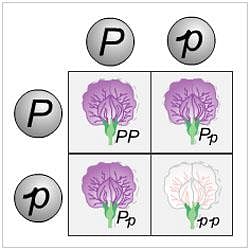Test: Inheritance of One Gene - NEET MCQ
15 Questions MCQ Test - Test: Inheritance of One Gene
What process needs to be avoided for carrying of efficient crosses?
What are the possible phenotypes that can be observed after self-crossing violet flowered pea plants that are heterozygous for the flower color gene (Vv)?
| 1 Crore+ students have signed up on EduRev. Have you? Download the App |
Which one of the following cannot be explained on the basis of Mendel's Law of Dominance?
Which of the following was not observed in F2 progeny of true-breeding tall and dwarf plants?
A plant that exhibits two alleles for only one trait is called ________
What should be the phenotype of a cross between violet and white-flowered true-breeding garden pea plants?
The presence of two different alleles at a particular locus results in _________
During meiosis, what happens to the parental alleles?
With green pods as a dominant trait over yellow, which of the following crosses will result in all progeny having yellow pods?


















